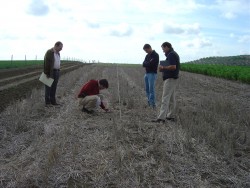Andalusian dry land agriculture, according to a study undertaken by the University of Cordoba, is one of the best tools Spain has to fulfil their commitment of reducing levels of CO2 emitted into the atmosphere. And, according to the investigations of the ‘Agronomía de Cultivos Herbáceos’ team (Agronomy in Herbaceous Cultivation), directed by professor Luis López Bellido, this type of cultivation helps to offset CO2 emissions thanks to a new no-till system and crop rotation that facilitate the concentration and permanence of carbon in the ground.
López Bellido’s team has published a comprehensive article on the topic in the latest edition of the Agronomy Journal in which they present to the scientific community the results of the long-term field experiment designated ‘Malagón’, started twenty three years ago and situated in the countryside of Cordoba. The results of ‘Malagón’ show that wheat, sunflowers, chickpeas and broad beans planted in the Andalusian countryside capture 4.8 million tonnes of CO2 from the atmosphere every year, which represents 16% of all CO2 emissions for Andalusia and 3% of all CO2 emissions for Spain. The experiment constitutes a controlled observatory to calculate the quantity of CO2 captured by the main herbaceous crops planted in the Andalusian countryside (wheat, sunflowers, chickpeas and broad beans) depending on various no-till and crop rotation systems.
The circulation of these investigations has roused international interest. The best evidence of this is the recent visit from a Japanese scientific team, comprised of doctor Aritomo Kawakita of the Rural Environment Division of the Japanese Ministry of Agriculture, Forestry and Fisheries, Yasukito Shirato from the National Institute of Agro-Environmental Science (NIAES) and Motoshi Hiratsuka and Kenji Wakasugi from Mitsubishi UFJ Research and Consulting, to the ‘Agronomía de Cultivos Herbáceos’ (Agronomy in Herbaceous Cultivation) team’s laboratory. During their stay, investigation group member Rafael López Bellido made known some of the results and future objectives of the project ‘Dynamics and sequestration of carbon in a dry land Mediterranean agriculture system: the no-till effect, crop rotation, N fertiliser and waste management,’ financed by the ‘Plan Nacional de I+D+i’ from the Ministry of Science and Innovation.


